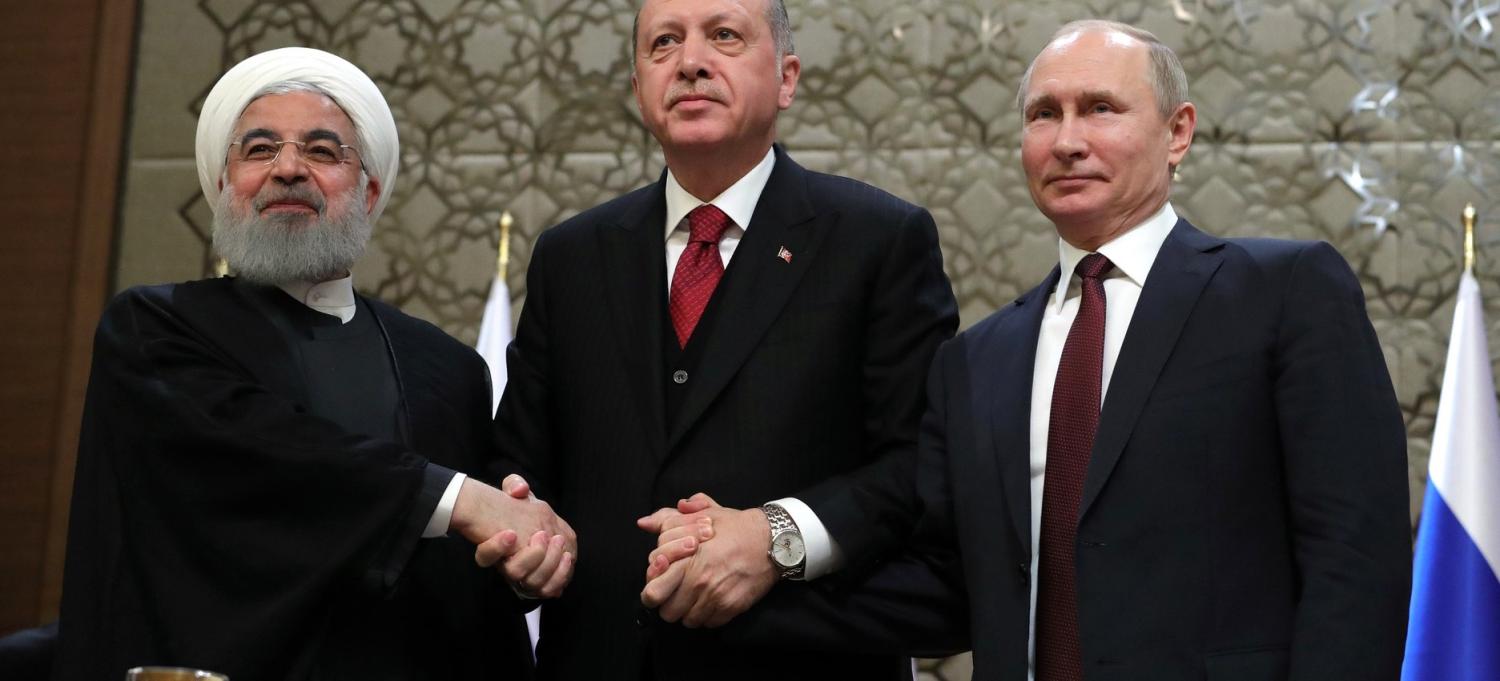It appears a new regional security order is encircling Syria as the civil war grinds into its seventh year. This shift was visible last week, when the leaders of Turkey, Iran, and Russia met in Ankara to discuss solutions to the Syrian crisis. The detailed talks covered de-escalation zones, humanitarian concerns, and intra-Syrian dialogue, but the broader motive was to agree on the role of each state once the conflict ends.
A further variable framed the meeting: potential US retrenchment from the region. On the same day as the Ankara summit, Trump told reporters in Washington that he was going to “get out” of Syria “very soon”.
Then yet another variable emerged: Assad’s troops were, according to John McCain, emboldened by Trump’s retreat, leading to a chemical weapons attack on the rebel-held city of Douma.
The horrific attack was significant enough for Trump to assign Assad the puerile nickname “animal”, but the hard reality is that any US response, even military action, will be tokenistic.
The march towards Syrian retrenchment is already set on a path: $200 million has been removed from the US budget for recovery efforts, military plans have been prepared for the quick withdrawal of the 2000 US troops in Syria, and there is little domestic hunger for renewed adventurism, let alone around a conflict this complex.
The takeaway from the Ankara meeting and Trump’s rhetoric is that the regional security order around Syria is in flux, and that US efforts are likely to be replaced by a zone of anti-Western influence stretching from Beirut through to the Caspian Sea.
Turkey’s participation and positioning within this order is arguably the most radical. Under President Recep Tayyip Erdogan, Turkey has viewed itself as the natural leader of the region, but the neo-Ottoman dream of previous Turkish strategic thinkers, such as Ahmet Davutoğlu, is now dead.
Instead, Erdogan is likely to set aside his grandiose ideational prose in exchange for pragmatism. One prominent example is Turkey softening its anti-Assad position in exchange for concessions along Turkey’s southern border to counter Kurdish groups.
Turkey has another problem, which the group of three can assist it with. The country’s political capital is declining. As a NATO member, it has access to US defence mechanisms on paper, but Trump’s frigidity towards Brussels, combined with erratic grand strategies, has left Ankara isolated and concerned about its place in the European security complex.
The result is an increase in Russia–Turkey security cooperation. For example, after nearly a decade of stuttering, Turkey has committed to purchasing the S-400 missile defence system, and this month commenced construction on the Akkuyu nuclear power plant (Turkey’s first).
In short, by softening its position on Assad, and by aligning its interests closer to Moscow, Turkey regains some security currency in a dangerous neighbourhood as the US presence degenerates.
The intersection of Iranian and Turkish interests is somewhat more complex, but both countries share a common interest in defeating Kurdish forces. From this position, both Moscow and Tehran have been muted about Turkey’s actions in Afrin, as courting Ankara on this front supports their longer-term ambitions for influence on the Mediterranean coast above Lebanon.
Iranian President Hassan Rouhani, for his part, is happy to see Kurdish groups around the Syria–Turkey–Iran triangle weakened as a result of Turkish actions. This allows it to focus on support for Hezbollah and the consolidation of territory around the Golan Heights. This region is critical because it allows the deployment of short-range missiles capable of hitting Israel, providing a deterrent against Israeli attacks. More broadly, for Tehran, a strong Hezbollah creates a counterweight against Saudi and Wahhabi influences in the north of Syria.
This leads us to Russia. President Vladimir Putin’s largest challenge will be filling any void the US leaves behind.
Conflict and recovery is an expensive business, and discussions of Moscow’s weak economy are often glossed over in analysis. Russia is a state with a GDP on parity with Australia, not with the US or Germany. Granted, it compensates for this across other variables: territory, energy, transit routes, and nuclear capabilities.
But the bottom line is that Russia has only spent around US$2.2 billion in military activities in Syria, while the US has spent $30 billion. An increase in spending to match the US is unlikely.
Consequently, when viewed as a whole, this group of three provides mutual benefits. Turkey maintains Afrin and weakens the cause of Kurdish nationalists around the southern border. Iran gets more reliable access to its interests in the Golan Heights. Russia maintains its presence in Tartus port, which provides a cost-effective way to project power into the Mediterranean and thereby avoid perceived containment by Western forces.
The group of three deals with the apparent deficiencies of each member. Russia can ameliorate costs by burden sharing and delegating military efforts. Turkey no longer needs to appease Western normative sensibilities when engaging Kurds in a security setting. Iran can leave Kurdish security to Turkey and focus on building a Shia-led counterbalance against Israel and Saudi Arabia.
This outcome will comfort neither those recovering from the chemical attacks in Douma, nor Kurdish nationalists. But it is perhaps a glimpse of the types of alliances and compromises that will emerge as the US-led security order winds down.

